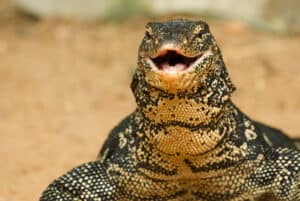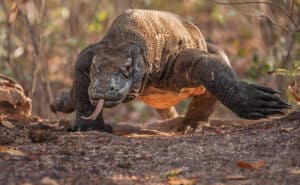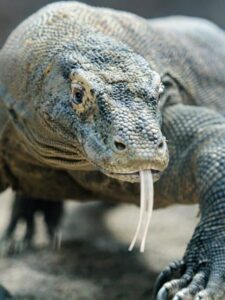The Komodo dragon is not a dragon; it can neither fly nor raze down a big city by breathing fire. However, it is the biggest lizard on Earth, stretching up to 10 feet long and weighing upwards of 150 pounds.
They are found on a number of islands across the Indonesian archipelago and have been there for hundreds of thousands of years according to scientists. Below are 10 fascinating facts about the Komodo dragon.
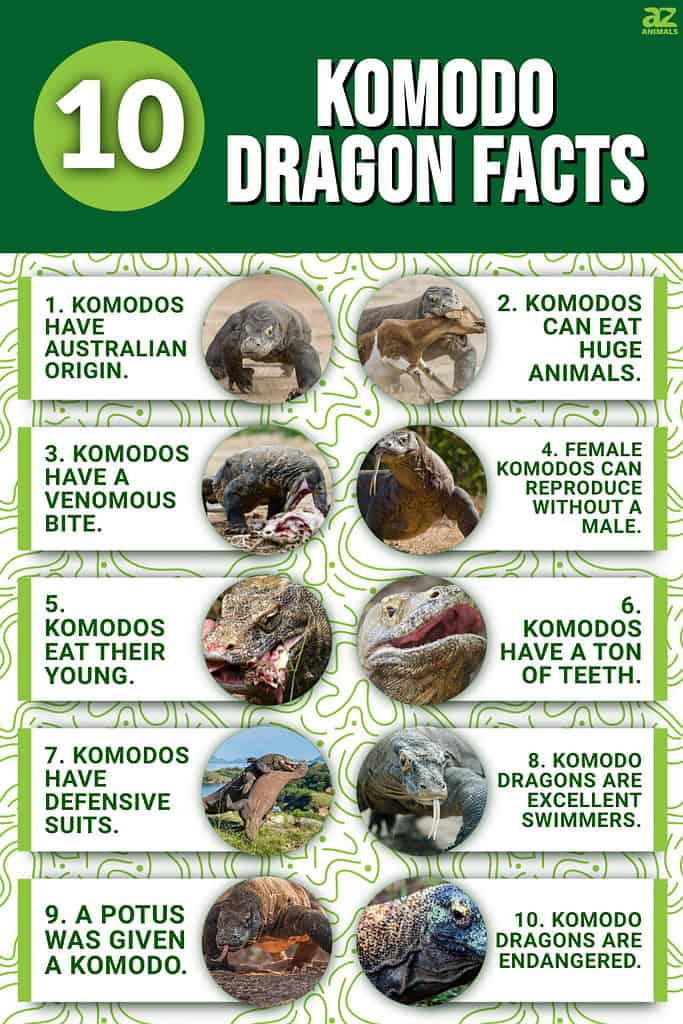
1. Komodo Dragons Have Australian Origin
While it is true that Komodo dragons are native to the Indonesian island of Komodo and other islands around it, they are originally from Australia. According to fossil records, Komodo dragons actually came from North East Australia and migrated to Indonesia during the Ice Age. This reportedly occurred around 900,000 years ago and they completely disappeared from Australia 50,000 years ago, possibly coinciding with the arrival of the first humans on the continent.
These figures are indicated by fossil records and the existence of Komodo dragons was unknown to the globe until the first world war.
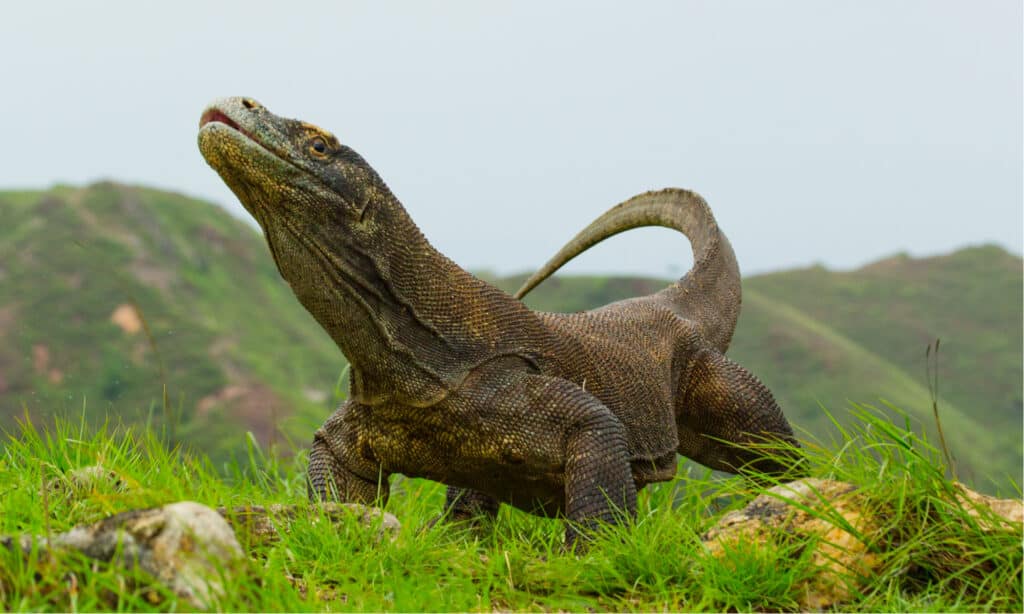
Komodo dragons disappeared from Australia 50,000 years ago.
©GUDKOV ANDREY/Shutterstock.com
2. Komodo Dragons Can Feed on Massive Animals
Komodo dragons are giant lizards and they can take down equally massive animals. We are talking large pigs, deer, water buffalos, and wild boars.
They are very strategic when it comes to catching their prey. They take advantage of their bodies to hide around the surroundings of their home islands while patiently waiting for an unsuspecting animal to pass. Once the animal is within sight, they swing into action, take the prey down and swallow them whole in some cases.
Scientists believe they can eat animals up to 80% of their weight in one sitting. Little wonder they can survive on a single meal for a whole month. After digestion, they regurgitate indigestible substances known as gastric pellets often containing horns, hair, and teeth.
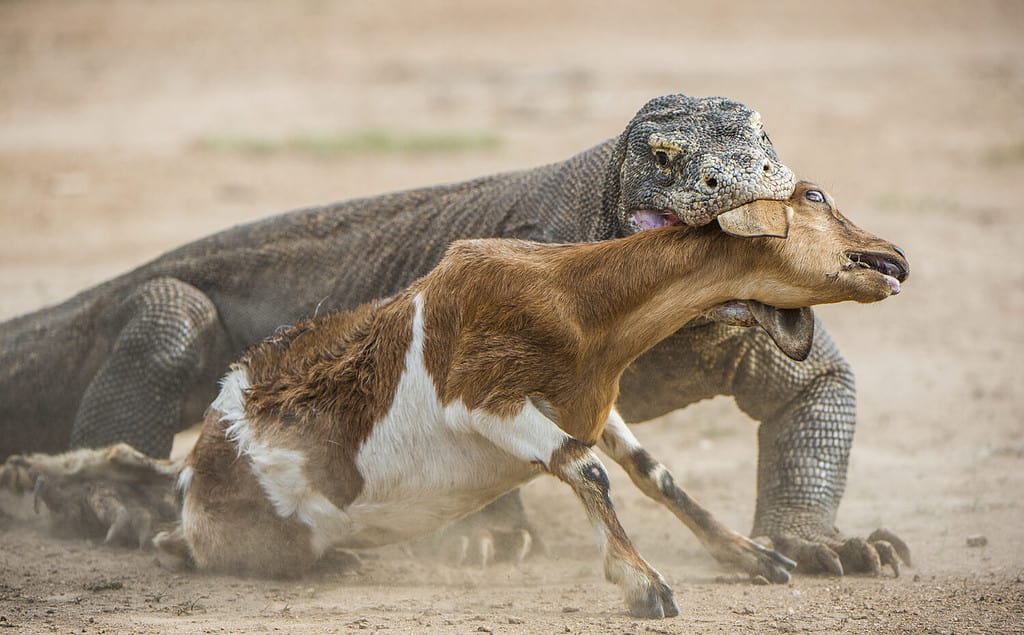
Komodo dragons can take down large animals including deer, pigs, water buffalo and wild boar.
©Sergey Uryadnikov/Shutterstock.com
3. Komodo Dragons Have a Venomous Bite
For so long, it was widely believed that Komodo dragons had no venom glands and that the lethality of their bites came from the insane amount of bacteria in their mouths. That makes a lot of sense considering they are scavengers who often feed on the flesh of rotten animals.
However, in 2009, researchers found that Komodo dragons were, in fact, venomous and were one of the few venomous lizards on the planet. However, rather than injecting the venom into their prey like snakes, the Komodo dragon’s venom seeps into the wounds of their victims. So, even if the prey somehow escapes, they will end up dying and the Komodo dragons would find their carcasses, thanks to their olfactory prowess.
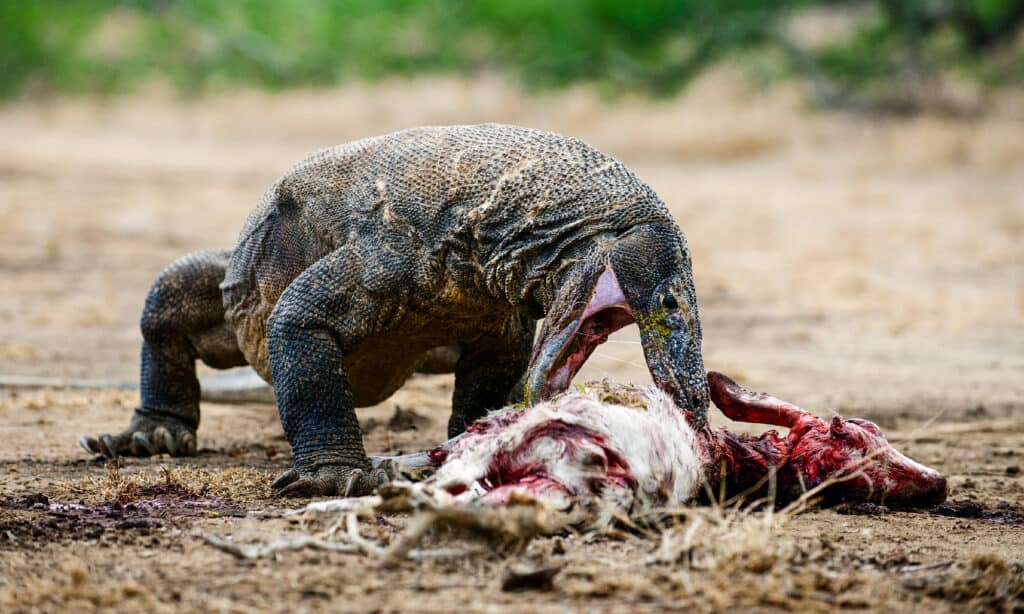
Once the Komodo dragon bites its prey, venom seeps into the wounds of their victims.
©Sergey Uryadnikov/Shutterstock.com
4. Female Komodo Dragons Can Have Virgin Births
One of the most incredible facts about Komodo dragons is the ability of their females to reproduce without a male. They are only one of a few creatures in the animal kingdom that have the ability to reproduce asexually, thanks to a process called “parthenogenesis.” During conception, they are able to play both father and mother without any qualms.
This was first confirmed in two London zoos, in a study involving two female Komodo dragons who laid viable eggs without male input.
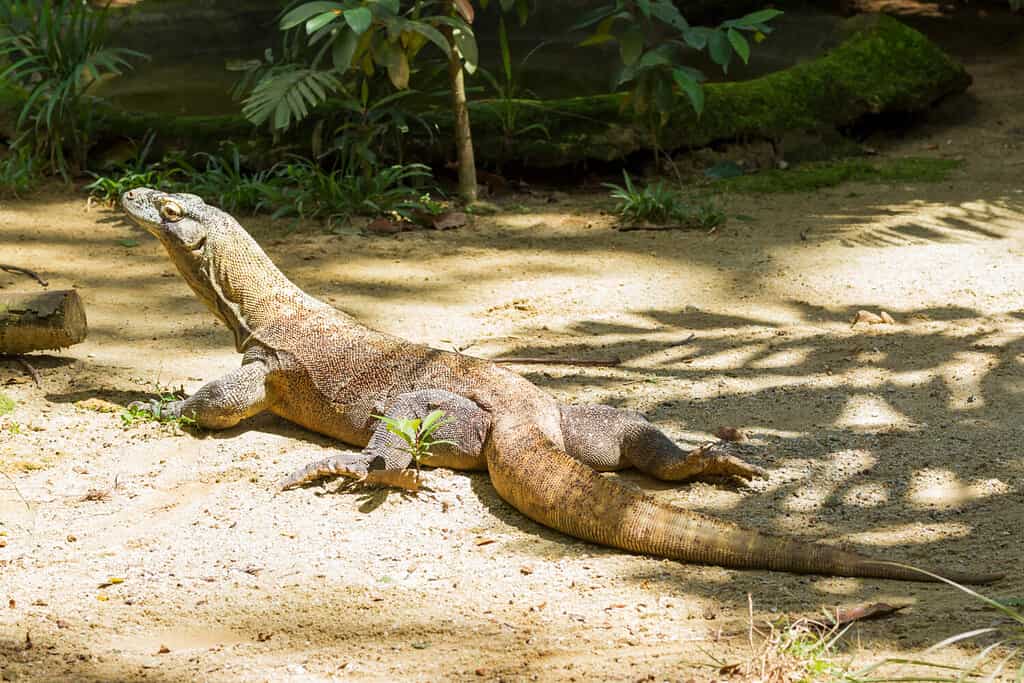
Female Komodo dragons have been observed in captivity reproducing without a male.
©Duc Huy Nguyen/Shutterstock.com
5. Komodo Dragons Sometimes Eat Their Young
When prey becomes scarce, Komodo dragons are sometimes left with no other option than to feed on their own young. That very much explains why some infant Komodo dragons spend much of their time on trees.
According to the Smithsonian National Zoo, some young Komodo dragons also wrap or roll themselves in feces thereby taking on a stench that the adult Komodo dragons are naturally inclined to avoid. Pretty ingenious trait, no?
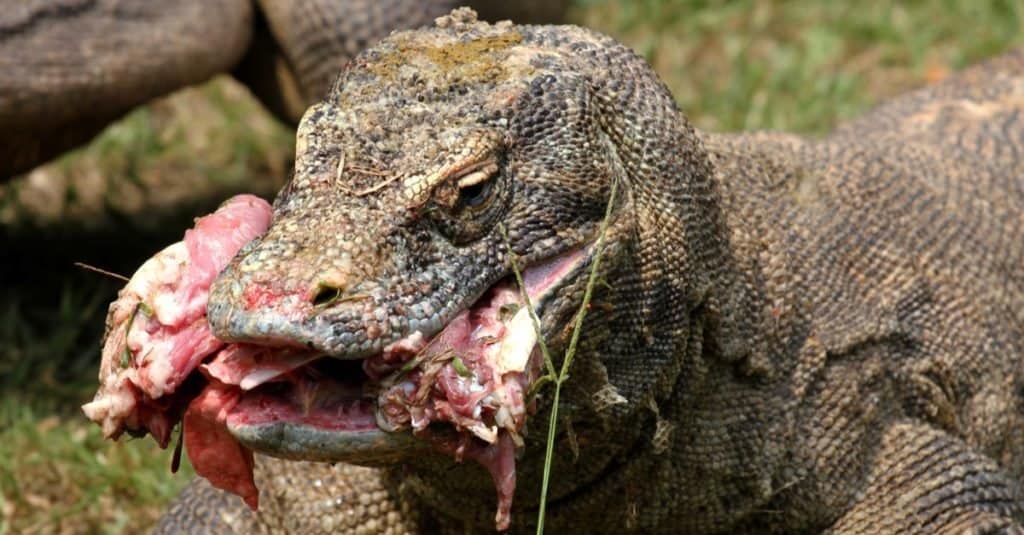
Komodo dragons can hunt and eat juvenile Komodos when prey is scarce.
©Yudi S/Shutterstock.com
6. Komodo Dragons Have a Ton of Teeth
If you take a look at the picture of a Komodo dragon with its mouth wide open, you might want to conclude they are toothless. However, Komodo dragons have about 60 teeth, the highest of any member of the class Reptilia. Scientists often compare their teeth to that of sharks because of the sharpness that allows them to cut deep into the flesh of their prey.
Also, when Komodo dragons lose a tooth, they can regrow it and this can happen as much as four to five times during their lifespan.
Now, about the seeming toothlessness you see in pictures: that’s actually a natural facade occasioned by their very thick gums. Komodo dragons have many teeth with which they can take down virtually any mammal.
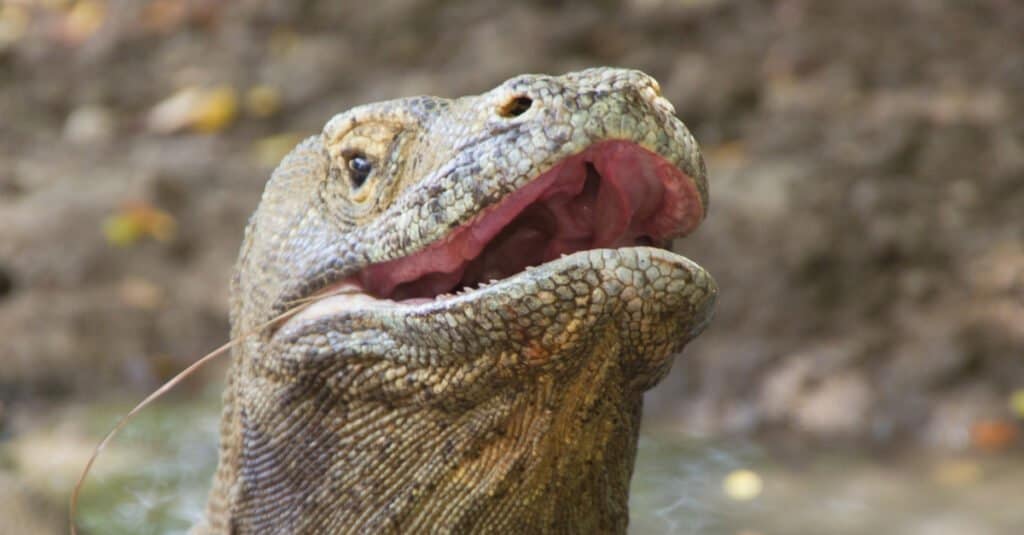
Behind their thick gums, Komodo dragons have around 60 teeth, the most of any in the Reptilia class.
©vladivlad/Shutterstock.com
7. Komodo Dragons Have Defensive Suits
Komodo dragons have a thick and rough outer skin with thousands of bones underneath. These bones are called osteoderms and contrary to what you may have just guessed, the bone deposits are not inborn. Rather, they develop with time and basically serve to protect them from one another as well as possible external predators.
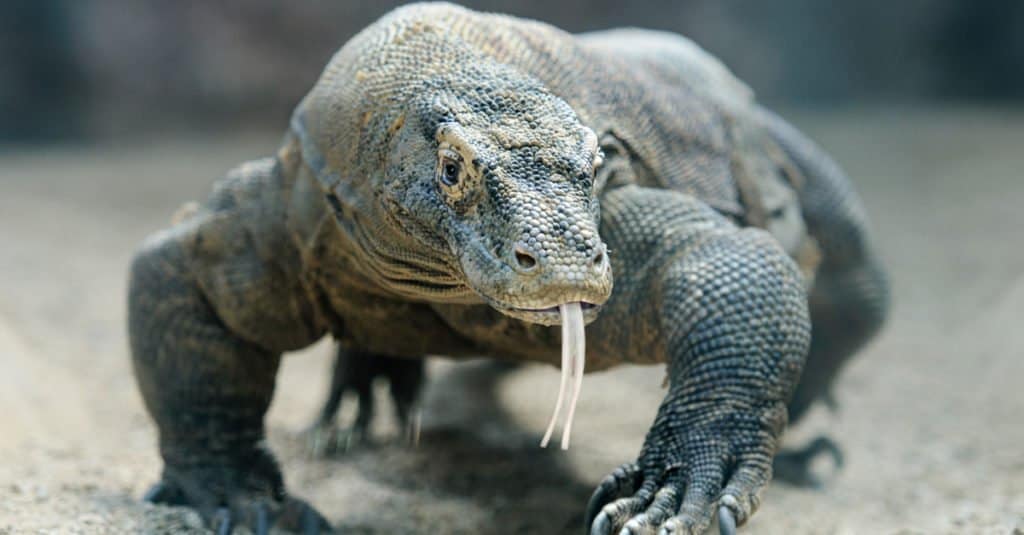
The Komodo dragon has a thick, rough outer skin covering thousands of bones.
©iStock.com/photomaru
8. Komodo Dragons Are Excellent Swimmers
For creatures that spend most of their time on land, Komodo dragons are excellent swimmers. They often have to travel between Indonesian islands in search of prey and can swim across a thousand feet distance without resting.
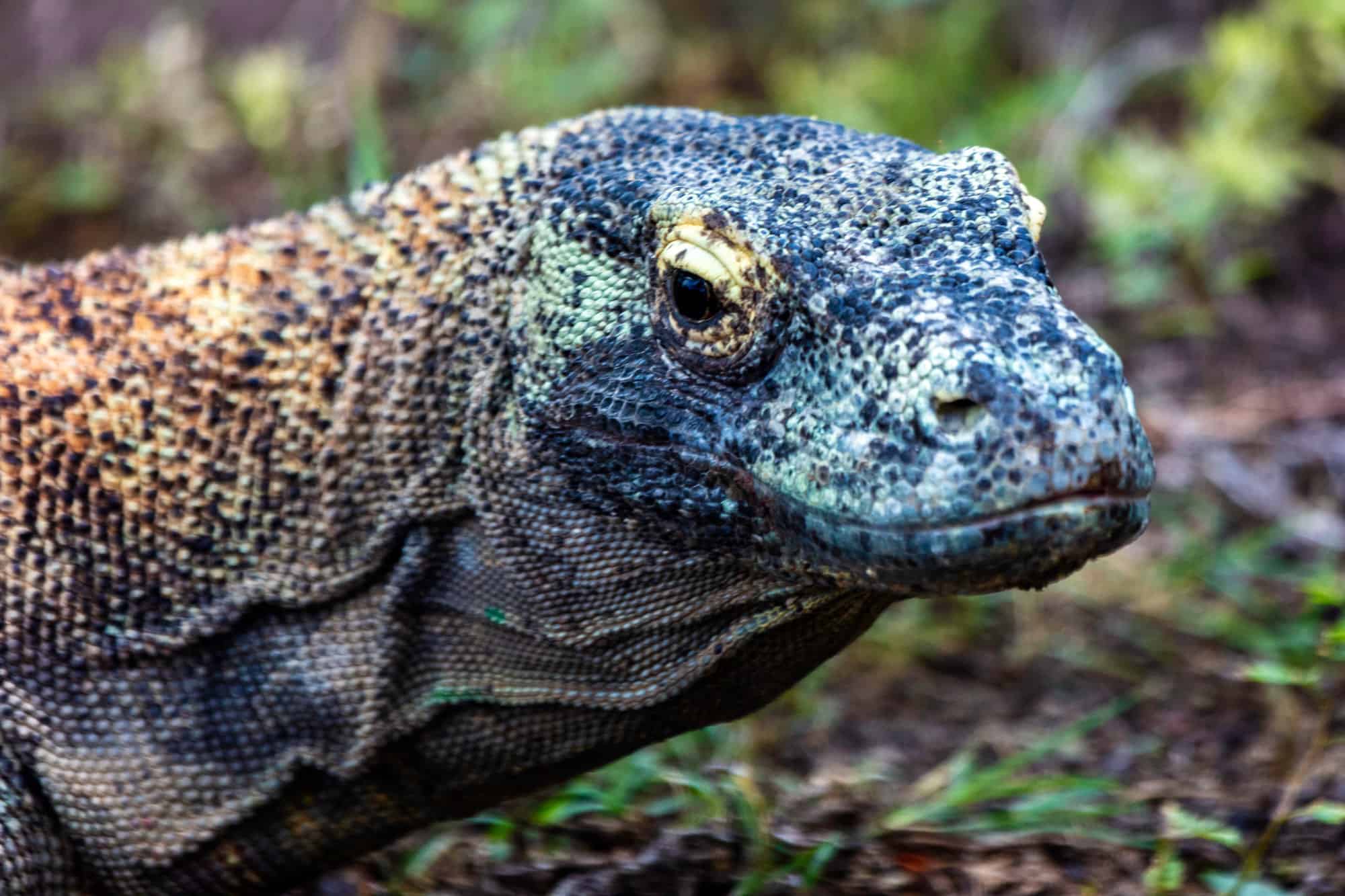
Komodos are efficient hunters on land and in water.
©iStock.com/desertsolitaire
9. A POTUS Once Got a Male Komodo Dragon as a Gift
You may or may not know that President George H. W. Bush was once gifted a male Komodo dragon by the Indonesian government. While it must have been tempting to keep the Komodo dragon somewhere in the White House, the president instead donated it to a Cincinnati zoo. The Komodo dragon, named Nega, passed away in 2007 at 24, leaving behind 32 young.
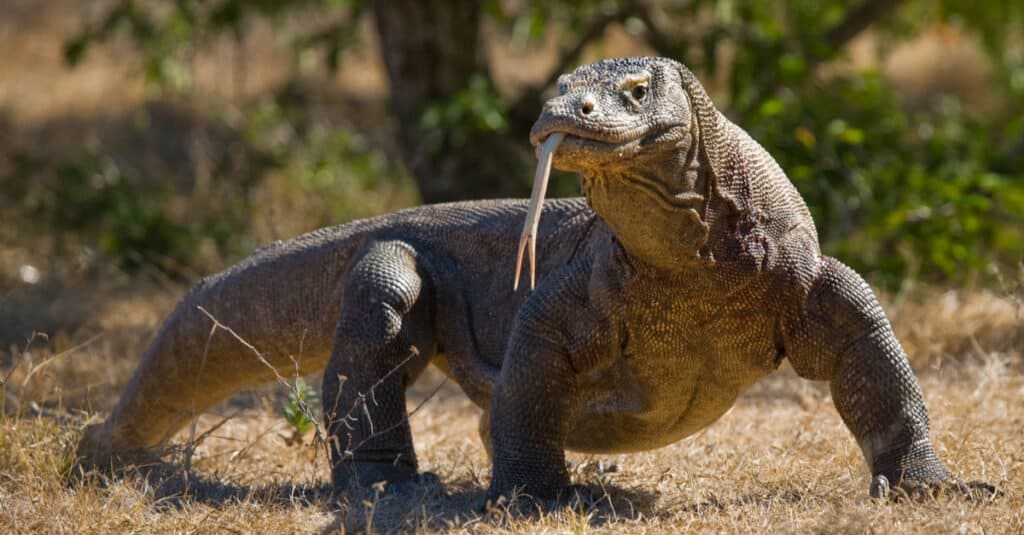
President George H. W. Bush was once gifted a male Komodo dragon by the Indonesian government.
©GUDKOV ANDREY/Shutterstock.com
10. Komodo Dragons Are Endangered
The International Union for Conservation of Nature (IUCN) has listed the Komodo dragon as an endangered species. There has been a serious and concerning population decline owing to habitat destruction and loss of prey to human hunters. The IUCN believes there are fewer than 1,400 Komodo dragons still existing in the wild.
However, there are a number of Komodo dragons within the Komodo National Park who face no serious threats currently.
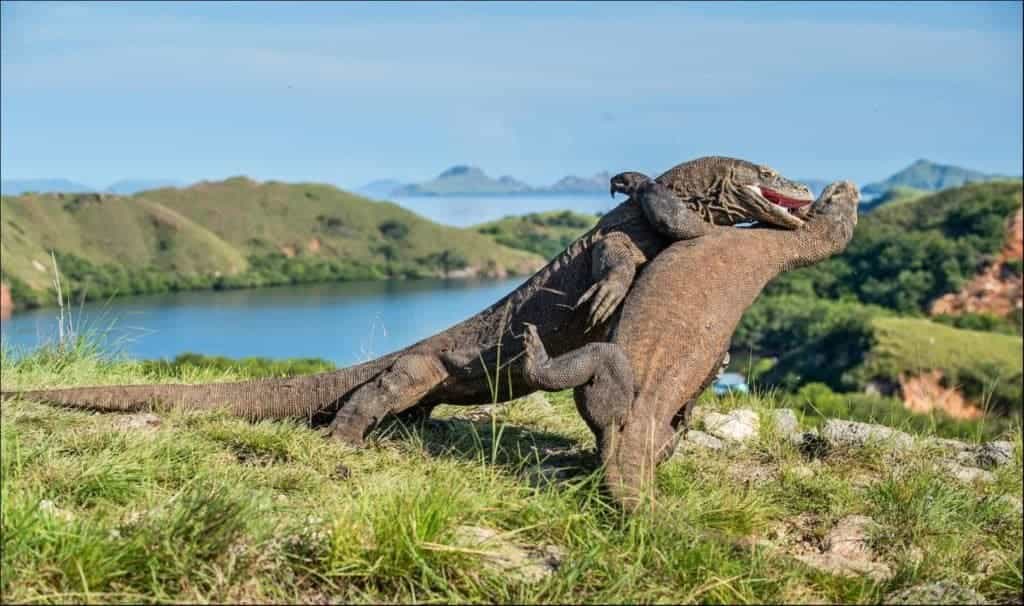
The IUCN believes there are fewer than 1,400 Komodo dragons still existing in the wild.
©Sergey Uryadnikov/Shutterstock.com
Are Komodo Dragons Dangerous to Humans?
Yes, Komodo dragons are very dangerous to humans. Komodo dragons are carnivores and can feed on large animals, such as deer and water buffalo, but that also includes people.
They are aggressive hunters and can attack, kill, and eat humans. As we know, in 2009, researchers determined that Komodo dragons are one of the few venomous lizards on Earth. Once the Komodo takes a bite, it pulls back the flesh while oozing venom from its mouth into the victim’s gaping wound. The venom speeds up the blood loss process, preventing clotting and decreasing blood pressure. This greatly weakens humans, stopping them from fighting back and leading to massive blood loss. Studies show a Komodo’s venom can kill an adult person within hours of being bitten.
Komodo National Park has reported 24 attacks on humans by Komodo dragons from 1974 to 2012, with five of these fatal. While it is rare for Komodo dragons to attack humans, it is highly advisable to stay clear of them in the wild and not to keep them as pets. You can read more about how dangerous these reptiles are here.
Watch a Fight Between a Komodo Dragon and a Python
Pythons and Komodo dragons are both carnivorous reptiles, ambush predators, and share the same habitat, so it is possible that the two species might encounter each other in the wild and clash.
As the Komodo dragon is an apex predator it is not usually considered prey by any other animal in its hunting area. They eat a wide variety of animals and are opportunistic hunters, so when they spot a source of food they will go after it.
But sometimes the prey a Komodo picks is too well-guarded. In this video, a Komodo dragon is featured stealing an egg temporarily left alone by a python. It is then seen battling a python. The snake quickly winds itself around the Komodo’s back leg and tightens its grip in a death wrap. In the video compilation, you can also see what happens to other victims of attacks by pythons. Check out a full breakdown of the video here and watch the action below!
Summary of 10 Incredible Komodo Dragon Facts
| Number | Facts |
|---|---|
| 1 | Komodo Dragons Have Australian Origin |
| 2 | 2. Komodo Dragons Can Feed on Massive Animals |
| 3 | Komodo Dragons Have a Venomous Bite |
| 4 | Female Komodo Dragons Can Have Virgin Births |
| 5 | Komodo Dragons Sometimes Eat Their Young |
| 6 | Komodo Dragons Have a Ton of Teeth |
| 7 | Komodo Dragons Have Defensive Suits |
| 8 | Komodo Dragons Are Excellent Swimmers |
| 9 | A POTUS Once Got a Male Komodo Dragon as a Gift |
| 10 | Komodo Dragons Are Endangered |
The photo featured at the top of this post is © GUDKOV ANDREY/Shutterstock.com
Thank you for reading! Have some feedback for us? Contact the AZ Animals editorial team.



